
The pancake batfish, Atlantic pancake batfish, Louisiana pancake batfish or spiny batfish, is a species of marine ray-finned fish belonging to the family Ogcocephalidae, the deep sea batfishes or seabats. This species is found in the Western Atlantic Ocean.

Ogcocephalus vespertilio, the Brazilian batfish or seadevil, is a species of marine ray-finned fish belonging to the family Ogcocephalidae, the deep sea batfishes. This species is found in the Western Atlantic Oceean. The Brazilian batfsish is the type species of the genus Ogcocephalus.

The red-lipped batfish or Galápagos batfish is a fish of unusual morphology found around the Galápagos Islands and off Peru at depths of 3 to 76 m (Froese, Rainer; Pauly, Daniel 2016). Red-lipped batfish are closely related to rosy-lipped batfish, which are found near Cocos Island off the Pacific coast of Costa Rica. This fish is mainly known for its bright red lips. Batfish are not good swimmers; they use their highly adapted pectoral, pelvic and anal fins to "walk" on the ocean floor. When the batfish reaches maturity, its dorsal fin becomes a single spine-like projection.

Ogcocephalus parvus, the roughback batfish, is a species of marine ray-finned fish belonging to the family Ogcocephalidae, the batifishes. This species has a wide distribution in the Western Atlantic Ocean.
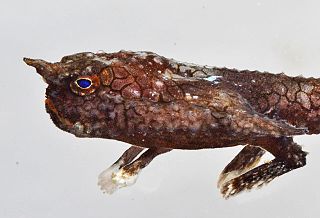
Malthopsis, the gnome batfishes or triangular batfishes, is a genus of marine ray-finned fishes belonging to the family Ogcocephalidae, the deep sea batfishes. The triangular batfishes are distributed throughout the warmer waters of the world, although they are absent from the Eastern Atlantic Ocean. The genus was originally proposed in 1891 by the British naturalist Alfred W. Alcock.
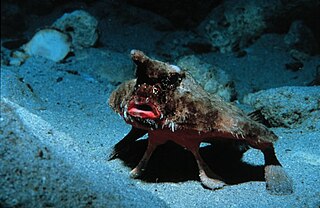
Ogcocephalus is a genus of marine ray-finned fishes belonging to the family Ogcocephalidae, the deep sea batfishes. The species in this genus are found in the Eastern Pacific Ocean and Western Atlantic Ocean, with most species in the eastern Atlantic Ocean where they live at shallower depths than the other ogcocephalid genera.

Zalieutes is a genus of marine ray-finned fishes belonging to the family Ogcocephalidae, the deep sea batfishes. The species in this genus are benthic fishes found in deep waters in the Western Atlantic and Eastern Pacific Oceans.

Ogcocephalus radiatus or the polka-dot batfish is an arrow-shaped fish in the family Ogcocephalidae with an elongated thin tail. It is dorso-ventrally flattened with round pectoral fins that sit flat on the bottom of the sea floor. It uses its pectoral fins and pelvic fins to "walk" along the bottom in a side-to-side shuffling motion.
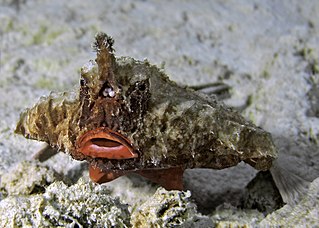
Ogcocephalus corniger, the longnose batfish, is a species of ray-finned fish belonging to the family Ogcocephalidae, the deep sea batfishes. This fish is found at depths between 29 and 230 m in the Atlantic Ocean, ranging from North Carolina to the Gulf of Mexico and the Bahamas. Like other members of the family Ogcocephalidae, it has a flat triangular body with coloring varying from yellowish to purple with pale, round spots. The lips are orange-red. Projecting from its head is a characteristic structure that is shared by other anglerfish.
Halieutichthys bispinosus, the two-spine batfish or spiny batfish, is a species of marine ray-finned fish belonging to the family Ogcocephalidae, the deep sea batfishes or seabats. This species is found in the Western Atlantic Ocean.
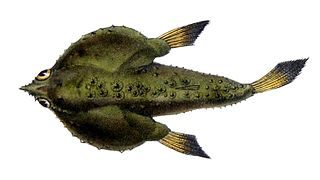
Ogcocephalus notatus, the marked batfish, is a species of ray-finned fish belonging to the family Ogcocephalidae, the deep sea batfishes. It is found in the tropical western Atlantic Ocean.
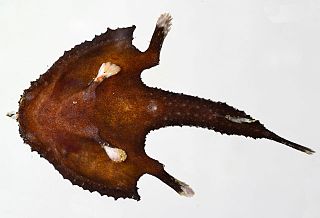
Malthopsis gnoma, the Atlantic triangular batfish, gnome seabat or grotesque seabat, is a species of marine ray-finned fish belonging to the family Ogcocephalidae, the deep-sea batfishes. The grotesque seabat is found in the Western Atlantic Ocean, in the Gulf of Mexico and Caribbean.
Ogcocephalus porrectus, the rosy-lipped batfish, is endemic to Cocos Island off the Pacific coast of Costa Rica. Though members of Ogcocephalidae occur in tropical, warm waters in both the Western Atlantic and Eastern Pacific. Rosy-lipped batfish generally reside in shallow to deep water benthic zones with a bathymetric range of 35 – 150 m. The syntypic series was collected at 120 m on a rocky bottom. What makes this fish distinctive are its rosy red lips, specialized pectoral fins used for "walking", and an illicium used for attracting prey.
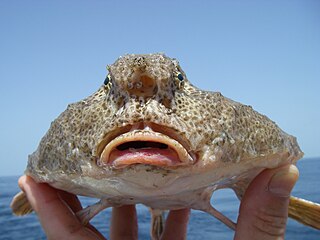
Ogcocephalus declivirostris, the slantbrow batfish, is a species of ray-finned fish belonging to the family Ogcocephalidae, the deep sea batfishes. This species is found in the western Atlantic Ocean from the northern Gulf of Mexico to the Straits of Florida.
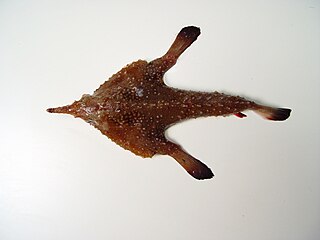
Ogcocephalus pumilus, the dwarf batfish, is a species of ray-finned fish belonging to the family Ogcocephalidae, the deep sea batfishes. It is found in the western Atlantic Ocean. It is the smallest species in the genus Ogcocephalus.
Ogcocephalus rostellum, the palefin batfish, is a species of ray-finned fish belonging to the family Ogcocephalidae, the deep sea batfishes. It is found in the western Atlantic Ocean.

Ogcocephalus cubifrons, the spotted batfish or polka-dot batfish, is a species of ray-finned fish belonging to the family Ogcocephalidae, the deep sea batfishes. This is an uncommon demersal fish found in the Western Atlantic Ocean and the southern Gulf of Mexico, in the United States, Mexico and the Bahamas.

Ogcocephalus nasutus, the shortnose batfish, is a species of ray-finned fish belonging to the family Ogcocephalidae, the deep sea batfishes. This species is found in the western Atlantic Ocean and the Caribbean.

The Caribbean batfish, also known as the two-spine batfish, is a species of marine ray-finned fish belonging to the family Ogcocephalidae, the deep sea batfishes or seabats. This species is found in the Western Atlantic Ocean.
Malthopsis bradburyae, Bradbury's triangular batfish, is a species of marine ray-finned fish belonging to the family Ogcocephalidae, the deep-sea batfishes. This little known species is found in the western Indian Ocean off Tanzania and is named in honour of the American ichthyologist Margaret G. Bradbury.

















